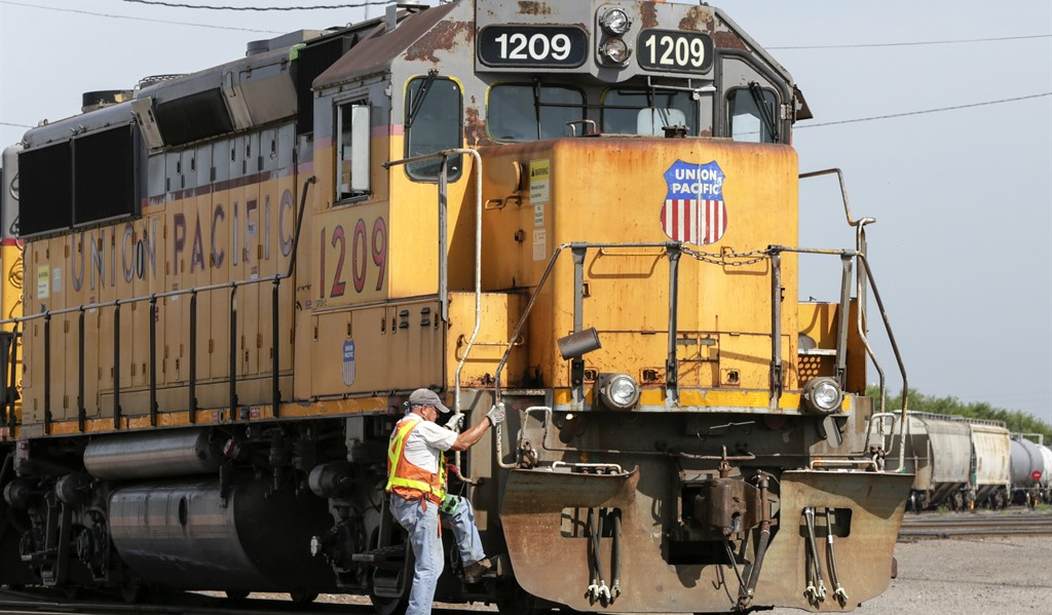With lingering bottlenecks in the U.S. supply chain and record-high inflation, the last thing America needs is another significant disruption of the transportation of goods and materials. However, a recent survey conducted by an alliance of railroad workers’ unions strongly suggests that’s precisely what might soon happen.
President Joe Biden and his administration could wind up in another humiliating supply chain debacle after its previous attempt to broker a peace deal between carriers and rail workers — using the power of an executive order — has seemingly failed, so far. The timing couldn’t possibly be worse for the struggling administration, with the midterm elections drawing near.
To be clear, a railroad worker strike would be an unmitigated disaster for America, and it would probably make the early pandemic supply chain issues, which were certainly bad, look like no big deal.
Railroad Workers United (RWU) surveyed its members, made up of thousands of rank-and-file rail workers across the country, regarding proposals put forth by the Presidential Emergency Board (PEB) executive order signed by the president in mid-July.
Since the U.S. government has legal input regarding railroad matters, given the impact that railroads have on the country and economy and especially because of the ramifications of a railroad worker strike, the purpose of the PEB was to act as an arbitration authority and present suggested solutions to bring down the temperature between rail carriers, unions, and workers.
The White House said in July of the PEB order:
Keeping supply chains running means keeping America’s railways running. In making the decision to create the Presidential Emergency Board, the President has considered input from relevant stakeholders. The President’s goal is to make sure America’s freight rail system continues to run without disruption, delivering the items that our families, communities, farms and businesses rely on.
The Presidential Emergency Board will provide a structure for workers and management to resolve their disagreements. The Board will investigate the dispute and, within 30 days of its establishment, deliver a report recommending how the dispute should be resolved.
The RWU survey, as The Hill noted, revealed that railroaders — a vast majority at 96% — are still unsatisfied with the terms of the PEB, and are ready to walk out on Sept. 15 — the date when the PEB-established “cooling off period” ends. RWU indicated on its website that it received just over 3,100 responses as of late August.
More than 3,000 RR workers took part in a recent RWU Survey. Their thoughts on the PEB? – No way! On striking? Exercise that right. Overwhelming across all unions and crafts, age groups and seniority.https://t.co/4cMFwZ5Rd7
— Ron Kaminkow (@KaminkowRon) August 30, 2022
According to KLKN, Biden’s PEB proposed a 24% pay hike over the next two years, which would be the largest hike in the industry in the past four decades. Clearly, it’s still not enough for railroaders, who say that such a hike won’t help combat rising costs as a result of Biden’s inflation, and there are other issues that workers say are more important than money.
Union representatives, like Jakob Forsgren of the Brotherhood of Maintenance Way Employes Division, insist that existing attendance policies need to be updated, and more needs to be done about safety for workers, given the extreme dangers of the job.
Related: A Tale of Two Joe Bidens
“Let’s be honest, these aren’t the safest jobs in the world at times, and so every day that me or my members go to work, we risk our lives,” Forsgren told KLKN. “And so with all due respect to the railroad executives, we risk things a lot more valuable than money.”
Forsgren also warned that a disruption in the railway system, especially on the eve of harvest season later this year, could be catastrophic to an already-crippled supply chain.
“We supply coal to power plants. We’re getting into harvest season, so we’re gonna start moving grain here pretty soon,” Forsgren told the outlet. “I mean it would drastically affect the supply chain, and again, that’s not something that the membership is wanting to do. We don’t want to do things like that. We would much rather get a fair contract that is worthy of ratification.”
Undoubtedly, the issue is actually probably at the top of the White House’s radar, at least internally, because if railroad workers do go on strike, the last thing Biden’s White House needs before an already-shaky midterm election is Americans fighting over toilet paper and baby formula shortages, again.
PJ Media’s Stacey Lennox has covered the issue, and Biden’s role in it, extensively. She noted what could become a major issue for congressional Democrats and the White House come mid-September when the PEB’s cooldown period expires.
Should the board fail to land on a mutually agreeable solution, Congress could make the recommendations of the PEB law and force the employees back to work. The process will conclude in mid-September, which means Democrats would have to force unions to accept a settlement right before the midterms.
How important are railroads? Ultra-important, to say the least. According to the Bureau of Labor Statistics (BLS), “Railroads haul the most freight of any form of transport in terms of ton-miles, a measure of cargo volume that considers weight and distance carried. Railroads now haul 40 percent of total U.S. freight, up from 27 percent in 1980, according to U.S. Bureau of Transportation data.”
With Biden’s PEB plan all but derailed, it’s time to hope and pray that the industry sorts it out before we’re all back in the store wondering why there’s no spaghetti sauce on the shelves, again.









Join the conversation as a VIP Member